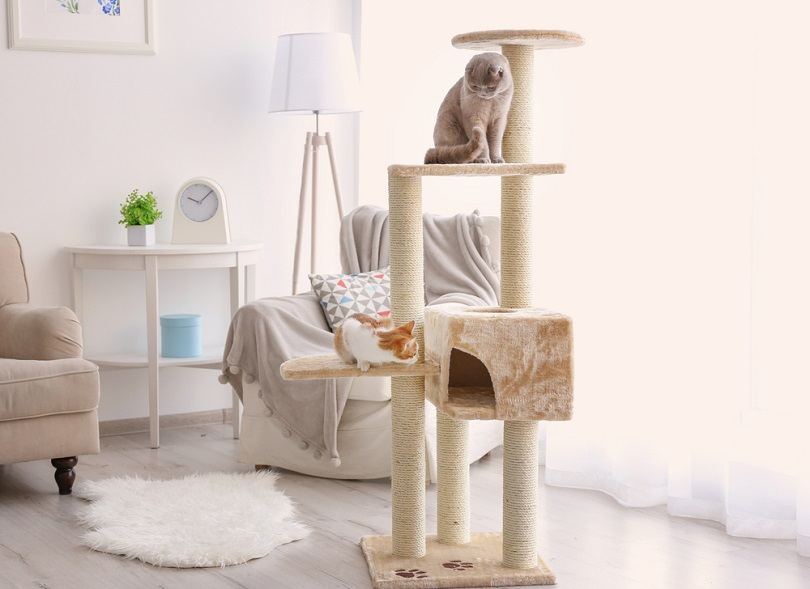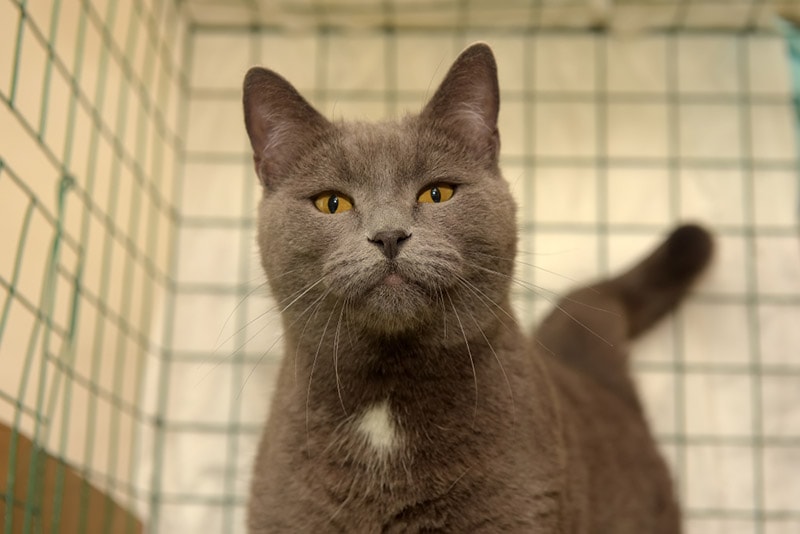How to Discipline a Maine Coon Cat – 10 Vet Approved Tips
Updated on
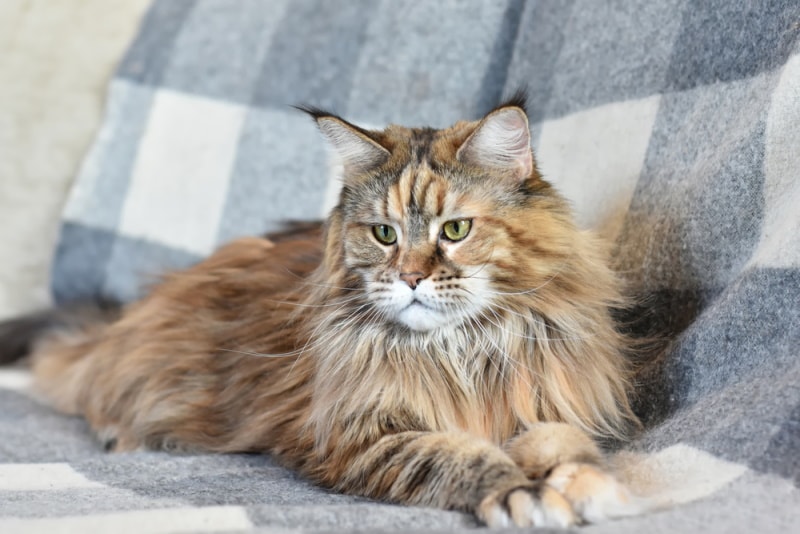
The Maine Coon is a large and majestic cat, but like all cats, they have a mind of their own. Most cats tend to get locked into naughty behavior because it gets a reaction from you, which is precisely why they love to misbehave.
Disciplining a cat is much different than disciplining a dog. What works for one will not work for the other. So, here are 10 tips on how to discipline your Maine Coon when they seem to be more naughty than nice at times.
The 10 Tips to Discipline a Maine Coon Cat
1. Figure Out What’s Causing the Problem
Before doing anything else, you must understand why your pet is behaving in this way. Maine Coons tend to be calm cats, so if they are acting out more than usual, you should figure out the reason.
Perhaps there’s been a change within the household that is upsetting them. Cats are not fans of altered routines, so if you’ve moved, redecorated, or added a new family member to the home, your cat might be reacting to it.
If you discover that something has changed and your Maine Coon is upset with it, you’ll need to address the problem. For example, if you have a new baby, there are a few steps that you can take, and there are also things you can do to help them deal with stress in general.
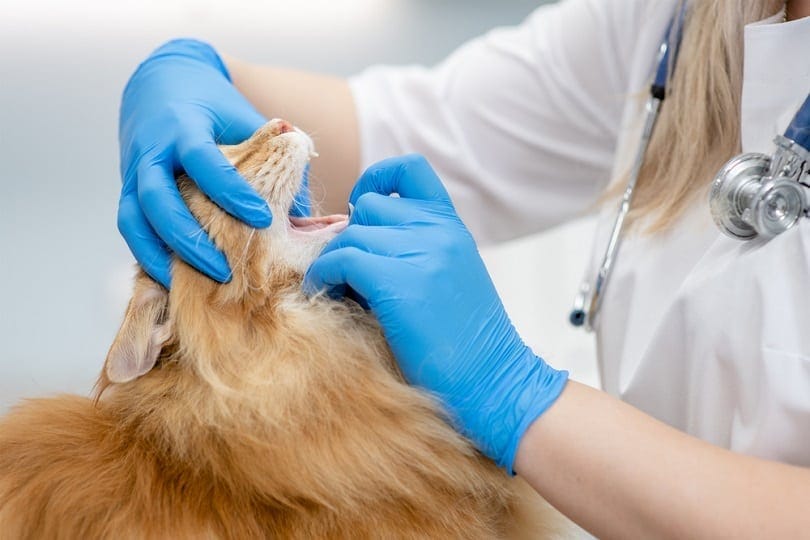
2. Determine If It’s a Health Issue
The behavior could be stemming from a health issue, or your Maine Coon might be in pain. Cats that don’t feel well can become more aggressive, so a trip to the vet might be necessary.
Your vet can help determine if there is a problem and might even offer a few suggestions if it isn’t health-related.
3. Make the Rules Clear for Everyone
Once you determine what exactly is okay and not okay for your cat to do in the home, you must communicate this information with everyone in the household. Things must be consistent, or the rules won’t work for your cat.
Whether your cat is new to your home or has been around a while, they will learn the rules eventually. If the cat should be kept off the kitchen counters and dining room table, everyone needs to know this so they can act accordingly.
4. Form a Strong Bond
This is an essential part of owning a cat. You’re less likely to encounter behavioral issues if your Maine Coon is bonded to you. Receiving your attention and playing with a cat can reduce the misbehaving.
When your Maine Coon does something wrong, you should ignore the behavior and avoid resorting to any kind of punishment. Focus on positively reinforcing behavior that you wish to see repeated in the future. Maintaining a good relationship with your cat is the best way to guarantee a real behavioral change. The more your cat enjoys spending time with you and trusts you, the less they will misbehave due to boredom or stress.
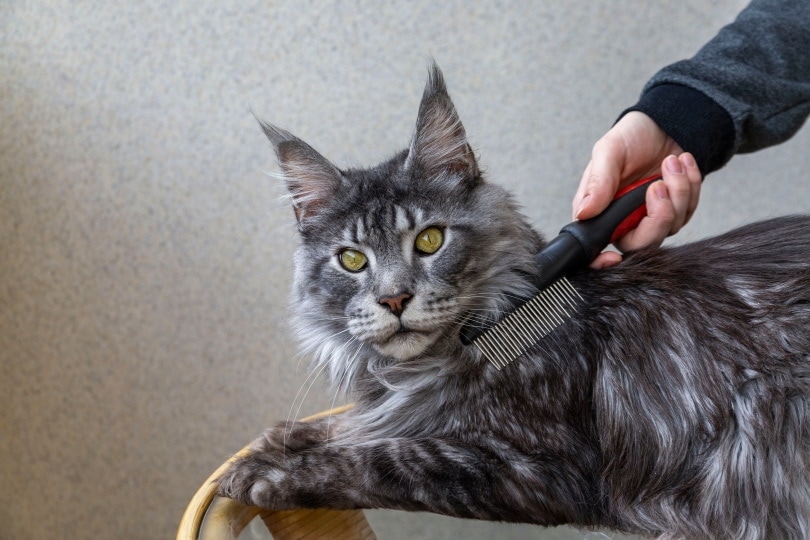
5. Ensure That They Have Enough Territory
A huge stressor for cats is not having enough space that they can call their own. This is even more important if you have other pets, as cats can be territorial. They will start misbehaving if they don’t have areas to hide or be comfortable.
Cats love high spaces, so you’ll want to invest in a few cat trees and maybe cat shelves. Of course, with a cat the size of a Maine Coon, you’ll want to take proper measurements so your cat can comfortably lie down and that the items will bear your cat’s weight.
6. Give Them Plenty of Attention
Many times cats misbehave because they are bored and want attention. This kind of boredom can lead to destructive behavior, but they might also overeat and overgroom.
Invest in new toys but keep a few in storage. Make sure you constantly rotate the old with the new and back again. This way, they are less likely to get bored with their toys.
Also, always find time to directly play with your cat. Having interactive toys is great, but nothing will beat playing with your cat, which can definitely help form that bond.
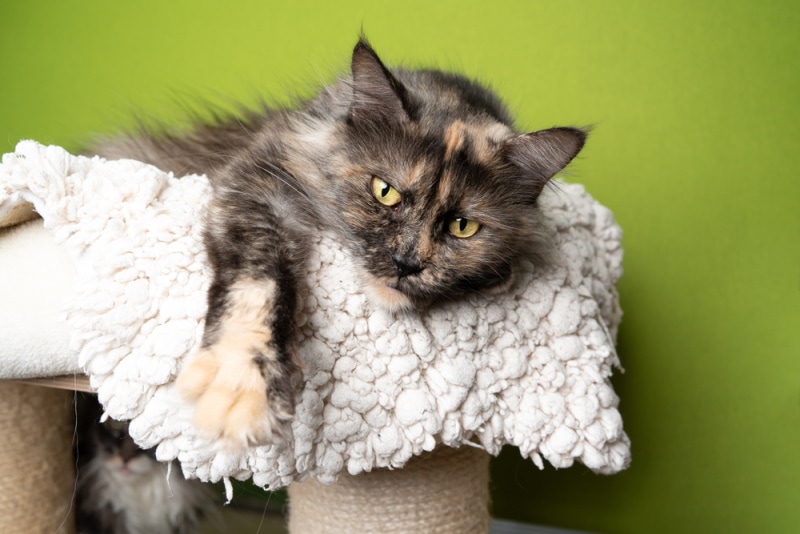
7. Use Deterrents
The best discipline is indirect discipline. This means you’ll want to deter your cat from the unwanted behavior via things that don’t involve you yelling or getting physical.
You can spend a bit of money and use deterrents made for cats, like sprays that taste or smell bad (cats dislike the smell of citrus, peppermint, and cinnamon). A spray that is activated by motion can be placed near an area that you want your cat to stay away from; the hissing sound will be enough to keep your cat from specific places like your counters.
There are also cheaper alternatives. Use sheets of aluminum foil on counters or in areas that you don’t want your cat to visit.
You can even make your own repellents. But here’s a critical warning: Essential oils are toxic to cats because they don’t have a particular enzyme in their livers to metabolize and eliminate the oils. It can be fatal if a cat ingests or inhales undiluted essential oils. Our recommendation is to avoid the use of essential oils around cats; diluted or not, they’re simply not worth the risk.
8. Determine If Your Cat Is Actually Misbehaving
When you notice your Maine Coon about to engage in naughty behavior, consider if the behavior is actually that naughty. A cat scratching your favorite chair isn’t technically bad, but rather normal cat behavior.
Ensure that your cat has the appropriate outlet for these issues. Pick up a few scratching posts, and use repellent spray or double-sided tape on your furniture. Make the scratching posts as attractive as possible (catnip can help).
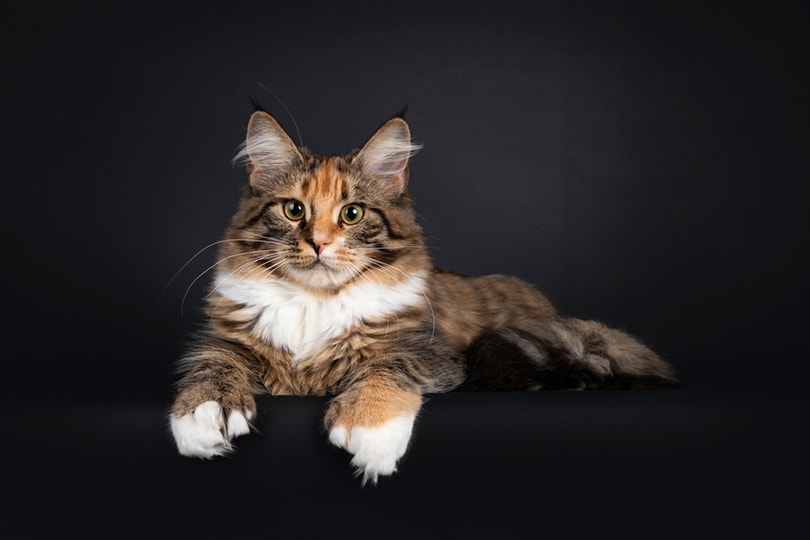
9. Reward Good Behavior
Positive reinforcement is always the best method to prevent bad behavior and works well for training. You’ll need to keep your cat’s favorite treats on hand for this.
When they do something good, give them a treat in addition to pets and praise. For example, if they are deterred from jumping on the counter because you put aluminum foil on it, they should be rewarded for other good behaviors that do not involve jumping on the counter.
This method takes time and plenty of patience and consistency, but cats are smart enough to learn that not jumping on the counter is a good thing.
10. Hire an Animal Behaviorist
A last-ditch effort is to bring in the professionals! If you’ve tried everything and your cat seems determined to continue on this road of naughtiness, you might need to bring in an animal behaviorist.
Start by talking to your vet, as they might have advice, or they can recommend a good behaviorist.
A cat behaviorist can work with you, observe your relationship with your cat, and give you tools and “homework” to do. The help of a professional should help improve things with your cat.
What Not to Do
The previous list contained tips that you can try with your Maine Coon to help curb bad behavior. Now let’s go over things that you shouldn’t do.
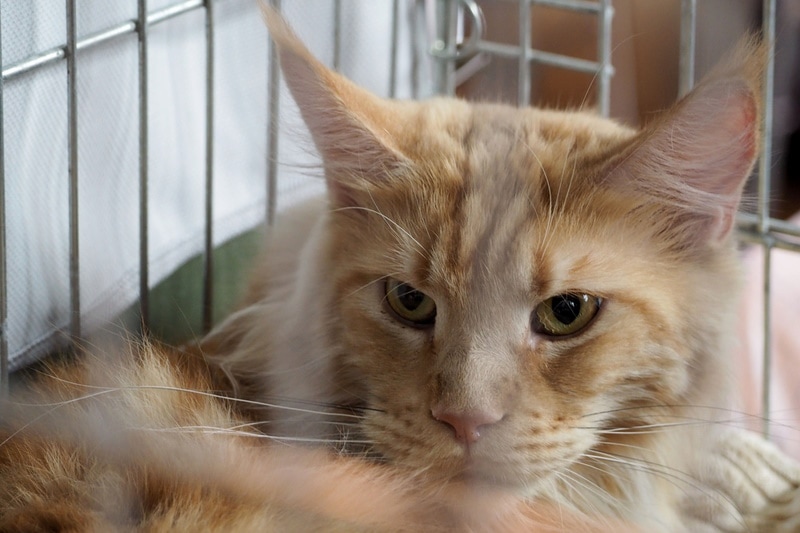
Physical Discipline
This one should go without saying, but hitting or being physically abusive in any way with a cat will only make them afraid of you. It can also make them more aggressive and more likely to bite and scratch because they feel attacked.
Yelling
When your cat is doing something wrong, especially if it’s dangerous, such as chewing on wires, you want to use a firm voice (and maybe a hand clap to startle them). But you don’t want to yell at your cat, as this will just make them fear you.
Confinement
Confining a cat in a room for a while (particularly without food, water, and a litter box) is bordering on animal abuse. This will only confuse the cat, and they won’t understand why they’ve been locked up. Any lesson that you’re trying to teach them is lost.
Spraying Water
This one is something that many cat parents try as a way to gently get their cat to stop the behavior. But while this will likely stop the behavior in the moment, it doesn’t teach the cat anything. Your cat will only learn to fear the spray bottle.
The other problem with this method is that your cat will learn that the water spray only occurs when you’re around. So, if you’ve been trying to get them to stop jumping on your kitchen counter, they will just do it when you’re not around.
In Conclusion
It’s not common to have a Maine Coon that misbehaves, as these giant cats are typically gentle and calm. But not every cat has the exact same temperament as the others of their breed.
Remember to first rule out any medical issues by seeing your vet and taking stock of any big changes that you’ve made around the house. The best way to fix a behavioral problem is to understand what’s causing it.
We hope that these tips will help you on your journey to forming a strong and loving bond with your Maine Coon.
Featured Image Credit: Akifyeva S, Shutterstock



